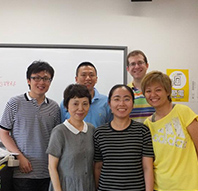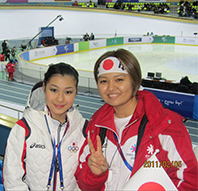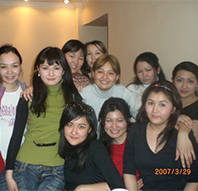Ainash Dussanova, International Student from Republic of Kazakhstan



-Which university are you from and what was your major?
Al-Farabi Kazakh National University, Faculty of Oriental studies. My major was Japanese Philology.
-What made you decide to study abroad?
The saying goes "It's better to see once than to hear 100 times." As my major was Japanese Philology, we had numerous courses on Japanese culture, history and also once or twice a week, we had the opportunity to attend classes with native speakers. For me, however, it was not enough. I think that when you're majoring in a foreign language, despite your age or your education to go to the country where the language you are studying is spoken is an essential part of the educational process. By studying abroad, you will not just improve your foreign language skills but also you will discover something new for yourself: new opportunities, new friends, and new points of view, which are necessary when you study a foreign language, especially if that language is Japanese. That's why I did my best to get the chance of going abroad. Actually this is my second stay in Japan; the first time was on a one year exchange program at Tsukuba University a few years back. It was only one year, but I made so many friends from all over the world, that I started to think widely about my future, and I was sure that I definitely needed to experience it again, but next time in full educational grounds. As a result, here I am.
-Why did you decide to study in Japan or at Keio?
Having done a lot of part and full time jobs for last few years, I’ve understand that no matter how high your rank or pay, if it’s not interesting to you and has no contribution to the society, you won't be happy; at least, I won’t. The feeling that someone needs you, the feeling that you're a part of something useful- those are my job essentials. I have a personal dream to get to work at UNICEF after graduation. I have some volunteering experience in my home country. I felt really happy while I was doing it, the feeling that someone needs you, that you really made some contributions to someone or something, so I decided that it would be great to have it as a job. That's why I decided to pursue a master's program at Keio University. This university has everything students need in order to guarantee a quality professional formation. I see Keio University as a perfect bridge between my past and my future.
-Please tell us about some of the aspects of your life in Japan or at Keio.
I worked at the Japanese Embassy for three years before coming here, so to be a student again feels great. And I am really enjoying my stay in Japan and Keio. I have just completed my first semester, passed my entrance exams for master program, and now I am just enjoying my life here. I joined a club named Plurio a few months ago. This club has helped me make a lot of friends at Keio University. I also joined a figure skating class in one of the sport clubs in Tokyo. I train there every Sunday. Japan has a very strong figure skating school, so I am very happy I can be a part of it, even if it's only once a week.
-What are differences you have noticed between Keio and your home university?
From an academic point of view, a master’s degree in Kazakhstan requires fewer domestic published works than a master’s degree in Japan. I also noticed that student's voices are not as necessary as in my home university. The educational structure in my home university follows pretty much a “student speaks – teacher listens” pattern, which is almost opposite to Japanese structure. All exams on humanities courses are oral, but it doesn't mean that pursuing a master’s degree here is easier than in Kazakhstan. It's not true that you will write a good paper just because you can speak a foreign language, especially if it's Japanese. The Japanese educational system has already proved to everyone that it has an outcome. Also, by studying here students get to know how to manage their time wisely. As long as students decide by themselves what courses to take and when, they will get to know how to organize their time in a right way. By using your time wisely you will do everything in time, study hard and surely you will always have time for leisure.
-Please tell us about what you feel you gained by studying at Keio.
My friends, experience, new points of view. When you are studying a foreign language, to be able to think differently from your mentality is very important. By meeting a lot of different people from company CEOs to university students, now I can say that I can do it.
It's only been six months since I started my stay in Japan, but I already feel that I have grown a lot as a person. As we grow, we change, some for better, some not, we make mistakes and learn from them. Two and a half years on, there's still a long way to go for me, and I am really excited about the results and impacts I will gain after that.
-What is your plan after you go back?
After I graduate from the master's program at Keio University, I will try my best to join UNICEF. I know it's not an easy task to achieve, but I still have two and a half years to build confidence in myself.
-Do you have any advice for students who are considering studying abroad?
Take your chances! Don't be afraid; you are not the first and definitely not the last one to do it. It's all about how badly you want it. Just take that first step and I am sure you will probably have the best year of your student life.
Information about Al-Farabi Kazakh National University
Al-Farabi Kazakh National University (also known as KazNU) is the country's oldest and largest university. It was ranked as number one among the top universities of Kazakhstan for the last few years in a row. It has the largest campus in the country with a total area of 100 hectares in one of the most beautiful places of Almaty.
About the writer
Ainash Dussanova
Research student
Graduate School of Human Relations
from Al-Farabi Kazakh National University.
* The facts are those at the time of the interview.
